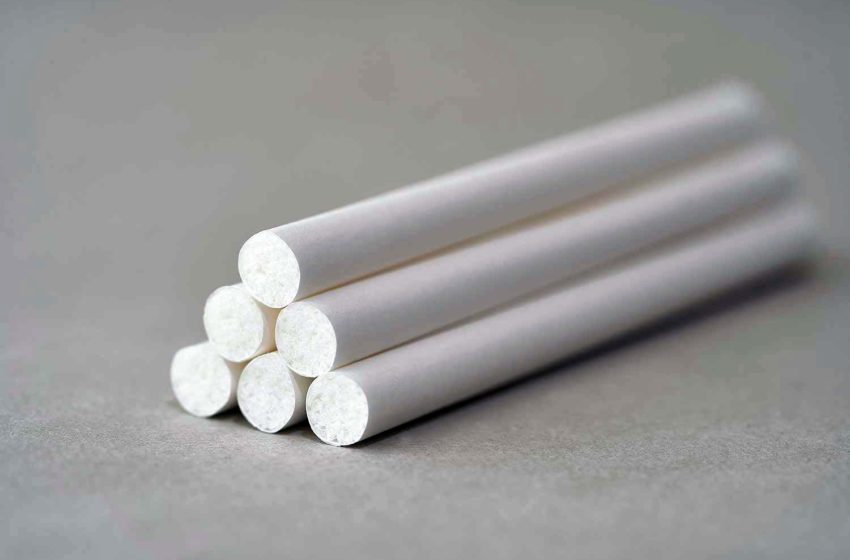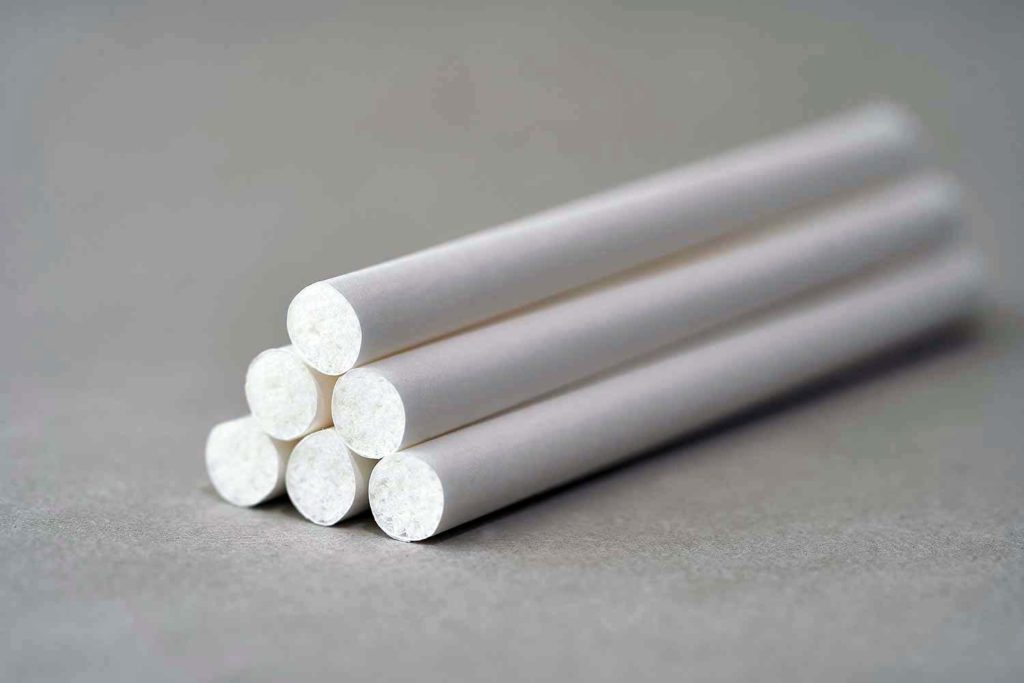Leaving No Trace
- Also in TR Filters Print Edition
- September 1, 2022
- 0
- 9 minutes read


McAirlaid’s Genia cigarette filters decompose in a matter of weeks rather than years.
By George Gay
Some time ago, Rachel Roddy, a food writer specializing in Italian cuisine, wrote in The Guardian newspaper’s Feast magazine that 80 percent of recipes could be improved by omitting the tomatoes usually included. Being a renowned tomato-phobe, I was delighted with this story and set out on a campaign to have the message more widely disseminated and acted upon—a campaign that was met with little success, I’m sorry to say, and that fell by the wayside.
But I was reminded of Roddy’s piece recently when reading the McAirlaid’s Vliesstoffe’s website, which, at one point, poses an intriguing question: Is it possible to achieve more by omitting something? Of course, I was a convert and knew the answer immediately. Yes. Leave out the tomatoes!
While answering yes to its own question, McAirlaid’s would not be too happy with my response, I think, because part of its business is focused on food packaging, and tomatoes probably figure in the makeup of that business. But I’m getting ahead of myself. This piece mainly concerns another aspect of the company’s business: cigarette filters—specifically, cigarette filters that offer tobacco-smoke taste similar to that provided by cellulose acetate filters but that are manufactured using only pure cellulose, free from bonding agents, and that, therefore, decompose in a matter of weeks rather than years as is the case with cellulose acetate products.
A Patented Process

McAirlaid’s specializes in manufacturing nonwoven absorption fleeces from pure, nonchlorine-bleached cellulose fibers using only a patented “airlaid” thermo-mechanical process to bond the fibers. In other words, the company omits from its SuperCore fleece the nonabsorbing bonding agents typically used to make fleeces, allowing SuperCore to achieve greater absorption and fluid distribution than is achieved using traditionally bonded fleeces.
The company, which sells its SuperCore fleece either as a raw material or as finished products, has four production sites in Germany and one in the U.S. Associate Sales Director Katja Selle told me during an email exchange that the company even had its own engineering department with machine design and building capabilities, which allowed it to develop “innovative and unique technologies.” Currently, it operates with five airlaid machines to produce its SuperCore fleece and more than 100 processing machines to service the particular requirements of the various markets with which it is involved and which it designates as food packaging, hygiene, medical, cigarette filters and home and garden.
And while McAirlaid’s products may rightly be described as environmentally friendly, so, too, can its processes. The company’s cellulose production, which is certified by the Program for the Endorsement of Forest Certification, operates with low carbon dioxide emissions and without the use of freshwater—and therefore without creating wastewater. Production buildings are climate controlled by means of efficient heat recovery systems.
McAirlaid’s, which now has more than 500 employees and customers in more than 70 countries, was founded in 1997 in Steinfurt, North Rhine-Westphalia, Germany, with production at its Heilbad Heiligenstadt factory starting the following year. It opened its third factory in Virginia, USA, operating as subsidiary, McAirlaid’s Inc., in 2006 and set up a new marketing organization offering Genia cigarette filters in 2017. 2020 saw the start of its first face mask machine.
The material that makes up Genia cigarette filters was developed by McAirlaid’s and is made from 100 percent EN-13432-certified cellulose produced using the same airlaid technology that is used for producing the company’s other products, though modified to meet the specific needs of the tobacco industry (EN-13432 is an industrial compostability standard). It is offered bleached or unbleached and is said to be available in just about any filter rod specification, including those suitable for heat-not-burn products. Genia filters are already part of tobacco cigarettes, filtered cigarillos and hemp cigarettes that are available in Europe, and, currently, tests and developments are being carried out in conjunction with many small and large manufacturers in the cigarette, cigarillo and roll-your-own segments.

Ahead of its Time
Development of these cigarette filters has been a long time coming. The founder of McAirlaid’s, Alexander Maksimow, recognized the littering problem associated with cigarette butts in the 1990s, at a time when, according to Selle, the market wasn’t ready to accept a change to more sustainable products. Once started, development took several years but was accelerated with the arrival of McAirlaid’s own rod-making machine, which allows it to manufacture efficiently at one of its German factories sample rods for testing by prospective adopters of Genia filters. This is important because Genia filters are always custom made for individual cigarette manufacturers after a joint development process aimed at identifying the most appropriate product to replace a cellulose acetate filter.
And things are likely to move much quicker in the future. The major filter producers are said now to have similar machines that run equally well as the one developed by McAirlaid’s, and the company has worked with filter-rod-machine builders to optimize the use of airlaid materials through their machines. Additionally, Selle said, McAirlaid’s airlaid material was being manufactured into filter rods and sold by global filter producers.
Selling Genia filter rods could be seen as pushing at an open door. These filters are price competitive and closely mimic the cellulose acetate products they are replacing, in respect of both their smoke-modifying and taste retention characteristics. But perhaps the major selling point is the fact that while carelessly discarded traditional cellulose acetate cigarette filters take up to 15 years to break down, Genia cigarette filters are biodegradable and compostable and break down within a few weeks of being discarded. Of course, McAirlaid’s emphasizes that the best option would be for smokers not to carelessly discard cigarette butts, but we are where we are, and a note on the company’s website indicates that, annually, carelessly discarded butts would fill up to 253,000 cargo containers. The number of containers that would be needed to house the butts carelessly discarded over the years that cellulose acetate filters have been widely used does not bear thinking about.
The construction of the Genia material is important from the point of view that it does not contribute to the ever-growing problem caused by micro-plastics being released into the environment. And it is important from the point of view that cigarette manufacturers need to comply with plastics reduction regulations in certain jurisdictions—regulations that are bound to become more widespread. At the same time, the material’s ability to break down quickly is important because it reduces the risk of butts being swallowed by water-dwelling or land-dwelling creatures. And it is important from the point of view of aesthetics, given that cigarette butts have long been an eyesore for many people, though one that seems to be reducing with the reduction in smoking in at least many Western cities.
Opportunities Ahead
With these advantages in mind, I asked Selle whether she thought there would be good opportunities for McAirlaid’s to grow its cigarette filters business in the future even though cigarette consumption overall might go down. She started by saying that her company was currently experiencing, especially in Europe, increased demand for sustainable alternatives to cellulose acetate, something that was being driven by various factors, one of which stemmed from a new European Commission regulation, the Single-Use Plastic Directive, which was put in place in July last year. Under the provisions of this directive, there was a package-marking requirement for products that included filters containing plastic of any kind, a designation that encompassed cellulose acetate filters but not Genia airlaid filters. In addition, there was the Extended Producer Responsibility policy, which levied a littering tax on, among any number of products, cigarette filters containing plastic. Again, Genia was exempt from the requirements of this policy. At the same time, McAirlaid’s was seeing an increased demand by consumers for sustainable products, so it was likely that demand would keep increasing.
In the U.S., the situation was different, Selle added. There, the Food and Drug Administration regulated the tobacco products sector, so moves toward the use of sustainable cigarette filters would first require the FDA to accept their use. This would come either through changes to their rules or through tobacco manufacturers agreeing to submit new cigarettes with sustainable filters through the premarket tobacco product application route. Consequently, McAirlaid’s was encouraging any U.S. tobacco company wishing to develop new products to consider a trial using Genia filters. For one thing, emerging initiatives, such as California’s proposed single-use plastic regulations, were likely to increase the momentum toward more sustainable materials.

